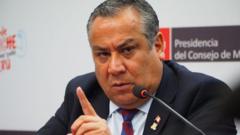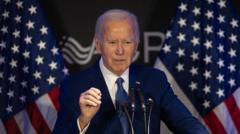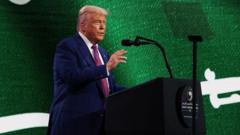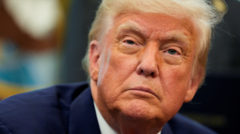While President Trump views the proposed $400 million plane from Qatar as a beneficial gesture, legal experts and rival politicians question the legality of such a gift, citing constitutional provisions against accepting foreign presents without congressional consent.
Legal Controversy Surrounds Trump's Potential Acceptance of $400 Million Plane Gift from Qatar
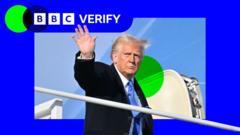
Legal Controversy Surrounds Trump's Potential Acceptance of $400 Million Plane Gift from Qatar
The Trump administration's consideration to accept a luxury jet gift from Qatar has ignited a legal debate about foreign gifts and potential constitutional violations.
The Trump administration's intention to accept a lavish Boeing jumbo jet, valued at approximately $400 million, from Qatar has stirred controversy and raised critical legal questions. President Trump himself has described the proposed gift as "a great gesture" and reiterated that he would be "stupid" to refuse it. However, many Democrats have labeled the move as "wildly illegal," emphasizing the need for congressional approval to accept foreign gifts.
Reports first surfaced suggesting that the jet, to be temporarily used as Air Force One while modified to meet security standards, would be transferred from the Qatari royal family to the Pentagon. Trump confirmed the transaction via Truth Social, highlighting the plane's necessity as a replacement for the aging Air Force One and praising Qatar for the offer.
Experts point to Article I, Section 9 of the U.S. Constitution, which explicitly prohibits elected officials from receiving gifts of any kind from foreign leaders without congressional consent. Legal analysts are scrutinizing various laws, including the Foreign Gifts and Decorations Act of 1966, which governs foreign gifts of significant value. Currently, the limit for gifts that U.S. officials can accept is set at $480.
In response to concerns, the White House has claimed that any donation to the government would adhere to legal requirements, though there remain many gray areas regarding the nature and value of such a gift. Notably, legal experts warn that the ramifications of using the plane post-presidency could cross ethical lines, especially if the aircraft transitions from government use to Trump's personal foundation.
Moreover, tensions between Trump's business interests and his presidency have been amplified during his current diplomatic trip to the Middle East, where he aims to secure business deals for his sons, Eric and Donald Jr., who manage the Trump Organization. As negotiations with Qatar unfold, the blurred lines between personal benefit and diplomatic engagement continue to be a focal point of scrutiny for both political opponents and legal experts alike.
As the scenario evolves, the implications for Trump’s administration, the legality of foreign gifts, and the potential precedents it sets are likely to become significant talking points in the ongoing scrutiny of presidential ethics and governance.

